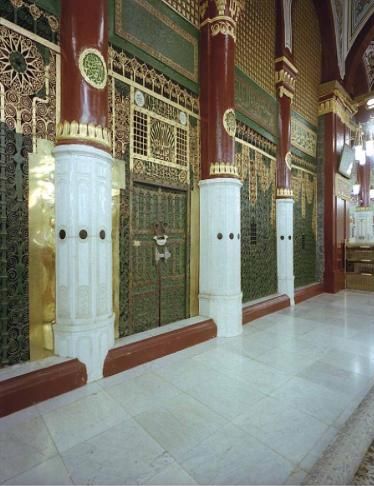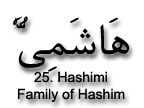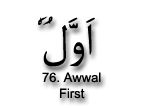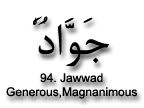 |
| Madina Sharif |
Ans. He was born on Monday, 12th Rabi Al Awwal,
April 22nd, 571 AC.
2. Where was the Prophet Muhammad (p.b.u.h.) born ?
Ans. In Makkah
3. What is the name of the Prophet's father ?
Ans. Abdullah Ibn Abdul Muttalib.
4. What is the name of the Prophet's mother ?
Ans. Aminah Bint Wahhab Ibn Abd Manaf Ibn Zahrah.
5. When and where did his (prophet's) father die ?
Ans. He died in Madina before Muhammad (p.b.u.h.) was born.
6. What is the name of the Prophet's grandfather ?
Ans. Abdul Muttalib.
7. What was his granfather's position ?
Ans. He was the chief of his clan Bani Hashim.
8. What is the Prophet's (p.b.u.h.) lineage up to his fifth ancestor ?
Ans. He is Muhammad Ibn Abdullah Ibn Abdul Muttalib Ibn
Hashim Ibn Abd Manaf Ibn Qusai Ibn Kilab.
9. Who suckled the Prophet Muhammad (p.b.u.h.) ?
Ans. First Thuyeba, the freed slave girl of his uncle Abdul Uzza
known as Abu Lahab, then Haleema Bint Abu Dhuaib,
best known as Haleema Al Sadiyah.
10. Who named the Prophet Muhammad (p.b.u.h.) ?
Ans. Abdul Muttalib.
 |
| Gumbad-e-Khizra |
11. What did Muhammad's (p.b.u.h.) mother name him ?
Ans. Ahmad.
12. Why did she (the Prophet's mother) choose this name ?
Ans. Because she saw an angel in a dream calling
the new-born baby Ahmad.
13. How old was Muhammad (p.b.u.h.) when his mother died ?
Ans. Six years old.
14. Where did his mother take him ?
Ans. She took him to Yathrib (Madinah) to visit her relatives.
15. Where did his mother die ?
Ans. On her way back to Makkah, she died at Abwa and was
buried there.
16. Who brought Muhammad (p.b.u.h.) back to Makkah ?
Ans. His father’s slave girl, Umm Aiman
(May Allah be pleased with her).
17. Who took the charge of his care ?
Ans. His grandfather Abdul Muttalib.
18. How long did The Prophet's grandfather take care of the
Prophet Muhammad ?
Ans. For two years.
19. How was his (Abdul Muttalib's) behavior with Muhammad(p.b.u.h.) ?
Ans. He loved him very much and preferred him to his own sons.
20. What did Abdul Muttalib foretell about his grandson ?
Ans. That he would hold a prestigious position.
 |
| Green Doam |
21. Who took care of the Prophet (p.b.u.h.) after the death of
22. How old was Muhammad (p.b.u.h.) when his grandfather
Abdul Muttalib died ?
23. When did Muhammad (p.b.u.h.) travel to Syria and with whom?
Ans. He went to Syria with his uncle Abu Talib when he was
twelve years old.
24. Who was Khadijah (May Allah be pleased with her) ?
Ans. She was a wealthy merchant of Makkah.
25. Why did she (Khadijah) want to marry Muhammad (p.b.u.h.) ?
Ans. Because of his truthfulness and good conduct.
26. When did she (Khadijah) marry Muhammad (p.b.u.h.) ?
Ans. When she was 40 years old.
27. How old was Muhammad (p.b.u.h.) at the time of the marriage?
Ans. He was 25.
28. What did he (the Prophet) give her (Khadijah) as Mahr (dowry)?
Ans. Twenty camels.
29. Was Khadijah (May Allah be pleased with her) a widow ?
Ans. Yes. The Prophet (p.b.u.h.) was her third husband.
30. How was Muhammad (p.b.u.h.) known in the society ?
Ans. He was known as Al Ameen (trustworthy) and
Al Sadiq (truthful).
 |
| Mohammed S.A.W |
 |
| Muhammad Sallahu alehi wasallam |
Ans. No, he didnt get any formal education from the society,
rather he was taught by Almighty Allah.
32. What should one say when the Prophet's (p.b.u.h.)
name is mentioned?
Ans. One should say ??? ???? ???? ????
(May the peace and blessings of Allah be upon him).
33. How many times is the name of Muhammad mentioned in the
Holy Quran ?
Ans. Four times.
34. What are the names of the Prophet’s (p.b.u.h.) uncles ?
Ans. They are: Harith, Zubair, Abu Talib, Hamzah
(May Allah be pleased with him), Abu Lahab, Ghidaq,
Maqwam, Safar and Abbas (May Allah be pleased with him).
mentioned ?
Ans. By the name of Paraclete.
36. What is Kabah ?
Ans. It is the oldest house of worship on the earth.
37. Who built it ?
Ans.The Prophet Ibrahim and his son Ismael
(May Allah be pleased with them).
38. How did Quraish arrange rebuilding of Kabah ?
Ans. They divided the work among various tribes.
Each tribe was responsible for rebuilding a part of it.
39. Who laid the stones ?
Ans. A Byzantine mason called Baqum.
40. Where did the Prophet (p.b.u.h.) go into seclusion ?
Ans. To the Cave of Hira.
 |
| Madina Sharif |
 |
| Madina Sharif |
Ans. True dreams.
42. When did the first revelation come down to him ?
Ans. On Monday, 21st of Ramadan, at night
(August 10th, 610 AC). He was forty years then.
43. Who brought it ?
Ans. Jibrael.
44. Who were the first to embrace Islam ?
Ans. Four persons: Khadijah his wife, Zaid Ibn Haritha his freed
slave, Ali Ibn Abi Talib his cousin and Abu Bakr his friend
(May Allah be pleased with them).
45. Who accepted Islam at the instance of Abu Bakr
(May Allah be pleased with him) ?
Ans. Uthman Ibn Affan, Zubair Ibn Awwam, Abdur Rahman
Ibn Awf, Sad Ibn Abi Waqqaas, Talha Ibn Ubaidullah and
Saeed Ibn Zaid (Umar’s son-in-law)
(May Allah be pleased with them).
46. Who were the ladies to accept Islam at first ?
Ans. Abbas’s wife Ummaul Fadl, Abu Bakr’s wife
Asma Bint Umais, his daughter Asma Bint Abi Bakr and
Fatimah Bint Al Khattab Umar’s sister
(May Allah be pleased with them).
47. How was the Dawah done in the beginning ?
Ans. It was done in secret.
48. How many people embraced Islam in the early stage ?
Ans. About forty.
49. How many years did the call in secret continue ?
Ans. For three years.
50. During this period, where would the Muslims gather secretly ?
Ans. They would gather secretly in the house of a Muslim called
Arqam to learn about Islam and the revelations sent down
to the Prophet (p.b.u.h.).
 |
| Masjid-e-Nabvi |
Ans. After three years when he received the revelation to that effect.
52. What was the impact of his public preaching?
Ans. The people accepted Islam increasingly.
53. What was the main miracle of the Prophet (p.b.u.h.)?
Ans. The Holy Quran.
54. Did the Prophet (p.b.u.h.) perform other miracles?
Ans. Yes, the splitting of the moon was one of them.
55. Who was Hamza bin Abdul Muttalib?
Ans. One of the Prophet’s (p.b.u.h.) uncles.
56. Name some of the disbelievers of Makkah who supported the
Prophet (p.b.u.h.), but did not embrace Islam until the end ?
Ans. Abu Talib, Mutim Ibn Adi and Abul Bukhtari.
57. How long did Abu Talib protect the Prophet (p.b.u.h)?
Ans. For 42 years – from the Prophet’s childhood until he himself died.
58. Who was Mutim Ibn Adi?
Ans. A chief of Makkah.
59. When did he (Mutim Ibn Adi) give protection to the Prophet (p.b.u.h.)?
Ans. When the Prophet (p.b.u.h.) returned from Taif and wanted to
enter Makkah.
60. When did he (Mutim Ibn Adi) die?
Ans. He was killed in the Battle of Badr.
 |
| Golden Gate of Prophet (p.b.u.h) |
Ans. He was a poet.
62. How did he (Abul Bukhtari) support the Prophet Muhammad (p.b.u.h.)?
Ans. He spoke out against the social boycott.
63. What lead the Muslims to emigrate to Abyssinia?
Ans. Their growing persecution at the hands of Quraish.
64. Which Surah lead to this emigration?
Ans. Surah Az Zumar.
65. When was Abul Bukhtari killed?
Ans. In the battle of Badr.
66. Who was then the King of Abyssinia?
Ans. The King of Abyssinia, known as Najjashi (the Negus),
during the time of the Prophet (p.b.u.h.) was As'hama.
67. When did the first group of Muslims leave for Abyssinia?
Ans. In Rajab, in the fifth year of Prophethood.
68. How many persons were there in the group?
Ans. 12 men and 4 women.
69. How were the emigrants received in Abyssinia?
Ans. They were received warmly and hospitably.
70. When did the second group of emigrants leave for Abyssinia?
Ans. In the fifth year of Prophethood.
 |
| Madina Munawwara |
 |
| Prophet Mohammed (p.b.u.h) |
71. How many people formed the group?
Ans. 83 men and 18 women.
72. Name a prominent companion included in this group?
Ans. Ja'far Ibn Abi Talib (May Allah be pleased with him).
73. What did Quraish do?
Ans. They despatched two envoys to Abyssinia to demand the
extradition of the emigrants.
74. How did the King respond?
Ans. He refused to extradite the Muslims and assured them of his
full protection.
75. When did Umar (May Allah be pleased with him) accept Islam?
Ans. At the age of 27.
76. Who was Bilal Ibn Rabah (May Allah be pleased with him)?
Ans. He was a slave of Umayyah Ibn Khalaf.
77. What was his (Bilal Ibn Rabah's) origin?
Ans. He was of Abyssinian decent.
78. What was the name of Bilal's mother?
Ans. Hamama.
79. Who was Yaser (May Allah be pleased with him)?
Ans. He was a slave of Abu Jahl.
80. Who was Sumayyah (May Allah be pleased with her)?
Ans. She was Yaser's (a slave of Abu Jahl) wife.
 |
| Jali Mubarak |
 |
| Madina Sharif |
81. Who was Ammar (May Allah be pleased with him) ?
Ans. He was Yaser and Sumayyah's only son.
82. How did Summaya (May Allah be pleased) die?
Ans. Abu Jahl murderded her with a bayonet.
83. Who was Zaid Ibn Haritha (May Allah be pleased with him)?
Ans. He was a slave.
84. Who purchased him (Zaid Ibn Haritha)?
Ans. Khadijah's nephew Hakim Ibn Hizam purchased him and
presented him to her.
85. What did Khadijah do with Zaid Bin Haritha?
Ans. She presented him to the Prophet who set him free.
86. Did Zaid Bin Haritha want to go to his parents?
Ans. No, he preferred to live with the Prophet (p.b.u.h.).
87. To whom was Zaid Bin Haritha married?
Ans. To Umma Aiman (May Allah be pleased with her).
88. Who was Ja'far?
Ans. He was the elder brother of Ali Ibn Talib
(May Allah be pleased with him).
89. Where did he (Ja'far) emigrate?
Ans. To Abyssinia.
90. Who was Ali (May Allah be pleased with him)?
Ans. He was the son of Abu Talib and cousin of the Prophet (p.b.u.h.).
91. When did Ali (May Allah be pleased with him) accept Islam?
Ans. When he was 10.
92. What was he (Ali) called for his bravery?
Ans. The "Lion of Allah".
Ans. He was Yaser and Sumayyah's only son.
82. How did Summaya (May Allah be pleased) die?
Ans. Abu Jahl murderded her with a bayonet.
83. Who was Zaid Ibn Haritha (May Allah be pleased with him)?
Ans. He was a slave.
84. Who purchased him (Zaid Ibn Haritha)?
Ans. Khadijah's nephew Hakim Ibn Hizam purchased him and
presented him to her.
85. What did Khadijah do with Zaid Bin Haritha?
Ans. She presented him to the Prophet who set him free.
86. Did Zaid Bin Haritha want to go to his parents?
Ans. No, he preferred to live with the Prophet (p.b.u.h.).
87. To whom was Zaid Bin Haritha married?
Ans. To Umma Aiman (May Allah be pleased with her).
88. Who was Ja'far?
Ans. He was the elder brother of Ali Ibn Talib
(May Allah be pleased with him).
89. Where did he (Ja'far) emigrate?
Ans. To Abyssinia.
90. Who was Ali (May Allah be pleased with him)?
Ans. He was the son of Abu Talib and cousin of the Prophet (p.b.u.h.).
91. When did Ali (May Allah be pleased with him) accept Islam?
Ans. When he was 10.
92. What was he (Ali) called for his bravery?
Ans. The "Lion of Allah".
Golden Words by Prophet Mohammed (S.A.W)
 |
| Ya Muhammad |
The Holy Prophet Mohammad (P.B.U.H) Said :
1) Four things that make your body sick :
a) Excessive talking
b) Excessive sleeping
c) Excessive eating and
d) Excessive meeting other people
2) Four things that destroys the body :
a) Worrying
b) Sorrow (Sadness/Grief)
c) Hunger
d) Sleeping late in the night
3) Four things that dry the face & take away its happiness :
a) Lying
b) Being disrespectful / impudent (insisting on something wrong knowingly)
c) Arguing without adequate knowledge & Information.
d) Excessive immorality (doing something wrong without fear).
4) Four things that increases the wetness of face & its happiness :
a) Piety
b) Loyalty
c) Generosity (being kind)
d) To be helpful to others without he/she asking for that.
5) Four things that stop the Rizq (Sustenance) :
a) Sleeping in the morning (from Fajr to sunrise)
b) Not Performing Namaz or Ir-regular in Prayers
c) Laziness / Idleness
d) Treachery / Dishonesty
6) Four things that bring / increase the Rizq :
a) Staying up in the night for prayers.
b) Excessive Repentance
c) Regular Charity
d) Zikr (Remembrance of Allah / God).
The Holy Prophet Mohammad (SAW), Also said to communicate to others even if you listen One Verse (Ayaah) & this one verse will stand on the Day of Judgment for intercession.
The Holy Prophet Mohammad (P.B.U.H) said, Stop doing everything during the Azaan, even reading the Quran, the person who talks during the Azaan will not be able to say the Kalima E Shahada on his/her death bed....
 |
| Door of Masjid-e-Nabvi |
Golden Words of Holy Prophet Mohammad (P.B.U.H)
1) The Prophet Mohammad (P.B.U.H) said : I am like a man who kindled a fire and when it lit up the place, the moths and the creeping insects began to fall into it. He tried to prevent them but they got the better of him and rushed into it. You and I are like that. I am seizing your girdles to pull you away from Hell-fire: "Come away from the Fire! Come away from the Fire.
2) All children of Adam are sinners, but the best among the sinners are those who constantly repent.
3) If someone wants to know what position he enjoys in the eyes of God, he has only to look at what place he gives to God (in his heart and life).
4) A Muslim is a Muslim's brother; he does not wrong him, nor desert him, nor look down upon him. Remember piety lies here! (and he pointed his fingers to his heart three times.) To belittle one's Muslim brothers (in thoughts or treatment) is enough of evil for a person to do.
5) Three characteristics are the signs of a hypocrite, even if he fasts, performs the Prayers and claims that he is a Muslim: when he speaks, he lies; when he makes a promise, he breaks it; and when he is trusted, he betrays his trust.
6) God has laid down certain duties, so do not neglect them; He has set certain boundaries, so do not overstep them; He has prohibited certain things, so do not violate them; about the rest of the things He has kept silent - out of compassion for you, not because He has forgotten (or made a mistake) - so leave them alone and refrain from questioning about them.
7) That Muslim is guilty of the most serious offence who enquires about something which is not forbidden for men, but is declared forbidden because of his questioning.
8) Do not belittle even the smallest act of kindness, even if it were no more than meeting your brother with a smiling and cheerful face.
9) Whatever hardship, pain, anxiety, grief, injury or sorrow afflicts a Muslim - even if it be as little as the pricks of a thorn - God makes it an atonement for his sins.
10) Backbiting means something that will offend your brother. Someone asked: 'But what if what I say about him is true?" He (P.B.U.H) replied: If that which you say about him is true, you have backbited him; but if it is not true, then you have slandered
him as well.
 |
| GUMBAD-E-KHIZRA .GREEN DOME |
Golden Words by Holy Prophet Mohammad (P.B.U.H)
* Acquire knowledge, it enables its professor to distinguish right from wrong; it lights the way to heaven. It is our friend in the desert, our company in solitude and companion when friendless. It guides us to happiness, it sustains us in misery, it is an ornament amongst friends and an armour against enemies.
* A Muslim who plants a tree or sows a field, from which man, birds and animals can eat, is committing an act of charity.
* There is a polish for everything that takes away rust; and the polish for the heart is the remembrance of Allah.
* What actions are most excellent? To gladden the heart of human beings, to feed the hungry, to help the afflicted, to lighten the sorrow of the sorrowful, and to remove the sufferings of the injured.
* The most excellent Jihad is that for the conquest of self.
* If you put your whole trust in Allah, as you ought, He most certainly will satisfy your needs, as He satisfies those of the birds. They come out hungry in the morning, but return full to their nests.
* When Allah created his creatures He wrote above His throne: 'Verily, my Compassion overcomes my wrath.
* Allah will not give mercy to anyone, except those who give mercy to other creatures.
* Say what is true, although it may be bitter and displeasing to people.
* Kindness is a mark of faith, and whoever is not kind has no faith.
* When you see a person who has been given more than you in money and beauty, look to those, who have been given less.
* If you do not feel ashamed of anything, then you can do whatever you like.
* O Lord, grant me your love, grant me that I love those who love you; grant me, that I might do the deeds that win your love. Make your love dearer to me than the love of myself, my family and wealth.
* It is better to sit alone than in company with the bad; and it is better still to sit with the good than alone. It is better to speak to a seeker of knowledge than to remain silent; but silence is better than idle words.
* Verily, a man teaching his child manners is better than giving one bushel of grain in alms.
* Whoever is kind, Allah will be kind to him; therefore be kind to man on the earth. He Who is in heaven will show mercy on you.
* It is difficult for a man laden with riches to climb the steep path, that leads to bliss.
* Who are the learned? Those who practice what they know.
* Allah has revealed to me, that you must be humble. No one should boast over one another, and no one should oppress another.
* Who is the most favoured of Allah? He, from whom the greatest good comes to His creatures.
* A true one is thankful to Allah in prosperity, and resigned to His will in adversity.
* One who meets with others and shares their burdens is better than one who lives a life of seclusion and contemplation.
Golden Words by Holy Prophet Mohammad (P.B.U.H)
 |
| Ya Mohammad (S.A.W) |
(1) When asked "What is Islam?" Prophet Muhammad (peace and blessings of Allah be upon him) said, "Abstinence from prohibitions and obedience to the commandments of God"
(2) "What is Islam?" someone asked Prophet Muhammad (peace and blessing of Allah be upon him) said, "Purity of speech and charity."
(3) The Messenger of Allah (peace and blessings of Allah be upon him) said, "None of you has faith unless I am dearer to him than his father and his son and all mankind."
(4) "A Muslim is he from whose tongue and hand other Muslims are safe, and a muhajir is he who forsakes what Allah has forbidden."
(5) Be in the world like a traveller, or like a passer-by in transit.
(6) Ibn 'Abbas (may Allah be pleased with him) relates that the Holy Prophet Muhammad (peace and blessings of Allah be upon him) holding him by his shoulder said "Live in the world as if you were a stranger or a wayfarer."
(7) Heaven lies at the feet of the mothers.
(8) A man is bound to do good to his parents, although they may have injured him.
(9) He who wishes to enter Paradise through the best door must please his father and mother.
(10) Feed the hungry, visit the sick, and free the captive if he be unjustly confined. Assist any person oppressed whether Muslim or non-Muslim.
(11) When you go to visit the sick, comfort him in his grief, and say, "You will get well and live long," because this saying will not prevent what is predestined, but it will solace his soul.
(12) The best person in Allah's sight is the best amongst his friends; and the best of neighbours near Allah is the best person in his own neighbourhood.
(13) Abu Hurairah (may Allah be pleased with him) relates that the Holy Prophet Muhammad (peace and blessings of Allah be upon him) said "He who believes in Allah and the Day of Resurrection let him cause no harm to his neighbour.
(14) Huzaifah (may Allah be pleased with him) relates that he heard the Holy Prophet Muhammad (peace and blessings of Allah be upon him) say "The backbiter shall not enter paradise."
(15) All Muslims are as one body. If a man complains of pain in his head, his whole body feels the pains, and his eye pains, his whole body feels the pain.
(16) All Muslims are like the component parts of a foundation, each strengthening the other. They must support each other.
(17) The creation is as God's family, for its sustenance is from Him; therefore the most beloved to God is the person who does good to God's family.
(18) No man is a true believer unless he desires for his brother that which he desires for himself.
(19) When three persons are together, two of them must not whisper to each other without letting the third hear, because it would hurt him.
(20) Were it not for fear of troubling my disciples, I would order them to clean their teeth before every prayer.
(21) God is pure and loves purity and cleanliness.
(22) No father has given to his child anything better than good manners.
(23) Respect people according to their eminence.
(24) The servants of the Beneficient are they who walk on the earth in humbleness.
(25) Humility and courtesy are acts of piety.
(26) Jabir ibn Abdullah (may Allah be pleased with him) relates that the Holy Prophet Muhammad (peace and blessings of Allah be upon him) said "He who is not merciful to others will not be shown mercy."
(27) Ibn Abbas (may Allah be pleased with him) relates that the Messenger of Allah Muhammad (peace and blessings of Allah be upon him) said "Show mercy to your young ones and respect to your elder ones."
 |
| Muhammad (S.A.W) |
99 Names of Prophet Mohammad (P.B.U.H)
| MASHAALLAH |









































































































